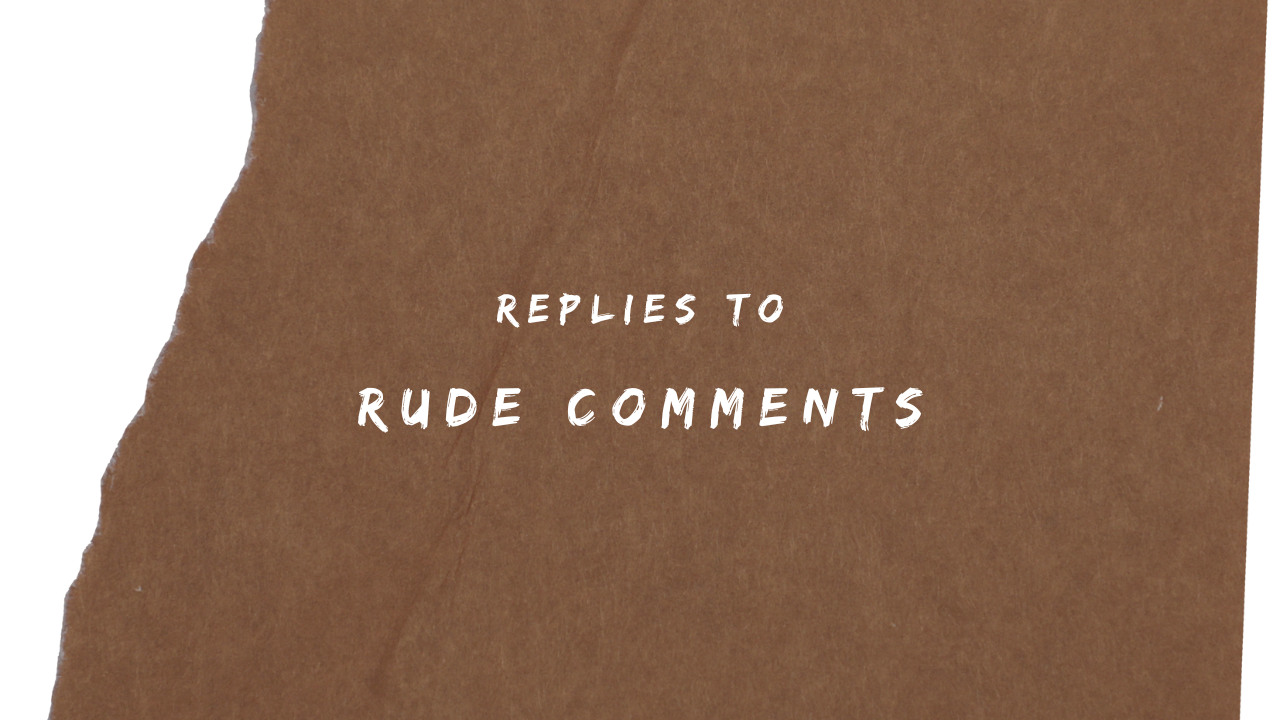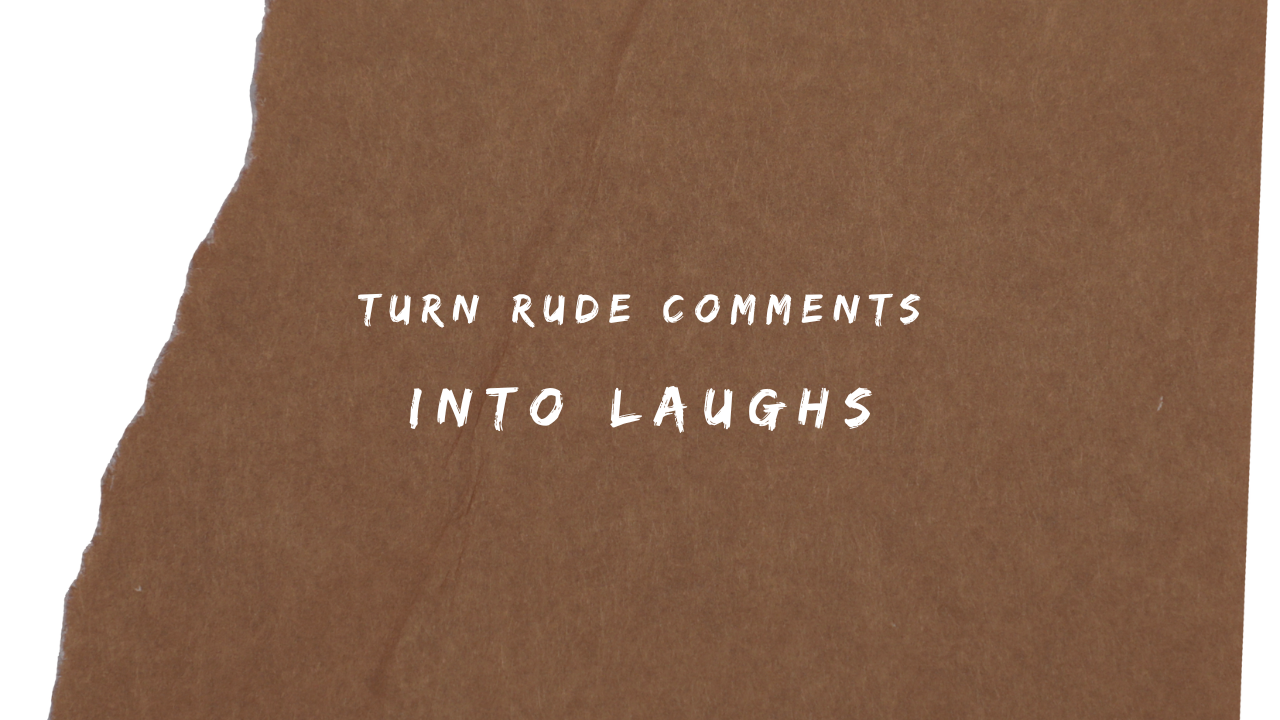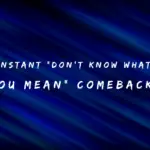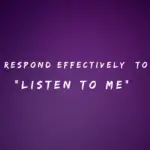Ah, rude comments. They can pop up anywhere—from social media to workplace interactions. It’s like a surprise party you never wanted, right? But seriously, the impact of these comments can be pretty significant. They can hurt, annoy, or just plain confuse us. So, how do we tackle them without losing our cool? In this article, we’ll explore why responding to rude comments is essential and how we can do it effectively without sinking to the same level.

150+ Replies To Rude Comments
Humorous Responses
- Thanks for your input! I’ll add it to my ‘Things I Don’t Care About’ list.
- I didn’t know we were having a roast! Where’s the grill?
- I’d agree with you, but then we’d both be wrong.
- Wow, that’s a great comment! Did you come up with that all by yourself?
- I’ll be sure to consult my crystal ball for your future comments.
- I appreciate your enthusiasm for negativity!
- Is that your final answer, or is there more to come?
- Thanks for sharing your opinion! Did you want it to come with a side of fries?
- Oh, you must be an expert in unsolicited advice!
- I’ll add that to my collection of ‘Things That Make Me Chuckle’!
Assertive Responses
- I don’t appreciate that comment; let’s keep this conversation respectful.
- Your rudeness isn’t necessary; I’m happy to engage in a constructive dialogue.
- That comment is uncalled for; let’s focus on the topic.
- I prefer to keep discussions positive. Please refrain from negativity.
- I’m here to discuss ideas, not insults.
- I value feedback, but it needs to be constructive, not hurtful.
- I’d appreciate it if we could maintain a civil tone.
- Please remember that respect goes both ways.
- Let’s agree to disagree without the rudeness.
- Your comment doesn’t add value to the conversation.
Polite Responses
- Thank you for sharing your thoughts; I appreciate different perspectives.
- I see where you’re coming from; let’s discuss it further.
- I appreciate your feedback, but I’d prefer a more positive approach.
- Thanks for your input! It’s always good to hear different opinions.
- I understand your viewpoint; however, I have a different perspective.
- Thank you for your comment; let’s focus on constructive dialogue.
- I appreciate your passion, but let’s keep our conversation respectful.
- Your feedback is noted, and I welcome more thoughtful contributions.
- Thank you for your opinion; I hope we can keep the conversation friendly.
- I appreciate your concern; let’s work on a solution together.
Educational Responses
- That’s a common misconception; let me explain.
- I understand your frustration, but here’s the context you might miss.
- It’s important to consider all sides; let’s discuss the facts.
- Rude comments often stem from misunderstanding; I’d love to clarify.
- Let me share some information that might change your perspective.
- I appreciate your input, but it’s crucial to consider the full picture.
- Did you know that [insert fact]? It might help frame the discussion.
- That’s an interesting point, but research shows otherwise.
- We can learn from each other; let’s explore this further.
- It’s always beneficial to look at issues from multiple angles.
Emotional Responses
- That comment hurt my feelings; I’d appreciate more kindness.
- I’m disappointed by that remark; I expected more support.
- It’s hard to hear comments like that; I value constructive dialogue.
- I’m genuinely upset by your words; let’s talk about it.
- Your comment made me feel undervalued; I hope we can do better.
- I wish we could communicate without insults; it’s disheartening.
- That comment stings; I’d love to understand your reasoning.
- It’s frustrating to see negativity; I hope we can uplift each other.
- I feel disrespected by that remark; can we try a different approach?
- Hearing that comment made me feel small; I hope we can be kinder.
Supportive Responses
- I believe in constructive conversation; let’s uplift each other.
- It’s okay to have differing opinions; let’s be respectful.
- Let’s focus on the positive; we can learn from each other.
- I appreciate your perspective; let’s discuss this kindly.
- We all have our struggles; I hope we can be more understanding.
- I know we can disagree without being rude; let’s try that.
- Your voice matters; let’s make sure it’s expressed positively.
- I value what you bring; let’s keep it respectful.
- Support and kindness go a long way; let’s promote that.
- We can build each other up instead of tearing each other down.
Dismissive Responses
- I’m not going to engage with that.
- That’s your opinion; I’ll choose to ignore it.
- Thanks for your input, but I’ll pass.
- I won’t waste my time on negativity.
- Let’s move on from that comment.
- That’s not worth my response.
- I see you’re having a rough day; let’s leave it at that.
- I’ll let that slide; it’s not worth my energy.
- I think we’ve exhausted this topic.
- Noted, but I’m not interested in that perspective.
Reflective Responses
- That’s an interesting point; can you elaborate?
- I see where you’re coming from; it’s important to consider all viewpoints.
- What makes you feel that way? I’d like to understand.
- That comment gives me something to think about; thanks.
- I appreciate your perspective; it helps me reflect.
- It’s good to challenge our ideas; let’s explore this further.
- I’ll take a moment to consider your viewpoint.
- Your comment has made me rethink my stance; thank you.
- That’s a valid concern; let’s discuss it more.
- I value the opportunity to reflect on different perspectives.
Deflective Responses
- Let’s focus on the main issue, not personal attacks.
- We’re getting off track; let’s steer back to the topic.
- That’s an interesting tangent, but let’s keep our focus.
- I prefer to discuss solutions, not insults.
- Let’s keep the conversation productive; negativity won’t help.
- I’d rather not get sidetracked by that comment.
- That’s a distraction from the main point: can we move on?
- I’d like to redirect this conversation to more constructive topics.
- Your comment is noted, but let’s focus on what matters.
- Let’s save personal opinions for later and focus on the discussion.
Counterarguments
- While I see your point, research shows otherwise.
- That’s an interesting perspective, but here’s another angle.
- I understand your concern, but I respectfully disagree.
- Your argument needs some context; let me explain.
- That’s one way to look at it, but let’s consider this evidence.
- I appreciate your viewpoint, but my experience tells a different story.
- I can see why you’d think that, but the facts suggest otherwise.
- That’s a common belief, but let me offer a different perspective.
- I hear you, but my position is based on different information.
- Your point is valid, yet we need to explore further.
Confrontational Responses
- Why would you say something like that?
- Was that a helpful comment?
- What makes you think it’s okay to talk like that?
- That was a rude thing to say; what’s your issue?
- Is there a reason you felt the need to be disrespectful?
- That kind of attitude isn’t going to help anyone.
- Are you trying to provoke me with that comment?
- I don’t appreciate being spoken to like that.
- What’s the motivation behind your rudeness?
- That’s an aggressive approach; let’s try to be civil.
Empathetic Responses
- I can see that you’re upset; what’s bothering you?
- It sounds like you’re going through a tough time; I’m here to listen.
- I understand why you might feel that way; it’s challenging.
- Your feelings are valid; let’s talk about it.
- I appreciate your honesty; it’s important to express our emotions.
- It’s understandable to be frustrated; let’s find a way to resolve this.
- I get where you’re coming from; let’s try to work through it together.
- I hear your concerns, and I’d like to help.
- That comment reflects your feelings; let’s address them.
- I’m sorry you feel this way; let’s discuss it.
Creative Responses
- If only sarcasm were a superpower, you’d be a hero!
- Interesting approach! Let’s see how that plays out.
- That’s a creative take on things; I hadn’t considered it.
- You know, that could be the plot of a comedy!
- That’s an original perspective; it could use some polishing.
- If this were a play, that line would be a dramatic twist!
- That’s a unique spin; let’s brainstorm some alternatives.
- I appreciate your imagination; let’s keep it constructive.
- Your creativity shines through, even if the message is a bit off!
- If we were writing a book, that comment would be a plot twist!
Self-Deprecating Responses
- You’re right; I must be an expert at messing things up!
- Well, I can’t deny my knack for attracting criticism!
- I guess I’m just a magnet for rude comments!
- I have a talent for getting under people’s skin!
- You’ve caught me; I’m still learning how to be perfect!
- Who knew I could inspire such passionate feedback?
- I should consider a career in irritating people!
- Looks like I’m in the running for ‘Most Likely to be Misunderstood’!
- I’ll add that to my list of ‘How Not to Communicate’!
- I could retire if I had a dollar for every rude comment I get!
Defensive Responses
- I didn’t deserve that comment; I was only trying to help.
- My intentions are being misunderstood here.
- You don’t know the full story; let me explain.
- That remark feels unfair, given the situation.
- I’m just sharing my thoughts; there’s no need for insults.
- I’m just as entitled to my opinion as you are to yours.
- That’s not how I intended it; let’s clarify.
- I feel attacked by that comment; can we talk it out?
- I think you’re misinterpreting my message; let’s discuss.
- I’m standing by my position; I believe it’s valid.
The Impact of Rude Comments
Rude comments can create a ripple effect that affects not only the person they are directed at but also those who witness them. They can create a toxic environment that stifles communication and breeds negativity. So, how do we combat that?
Why It’s Important to Respond
Responding thoughtfully can defuse tension, assert your boundaries, and even turn a negative interaction into a productive one. Think of it as an opportunity to showcase your emotional intelligence.
Understanding Rude Comments
- What Constitutes a Rude Comment?
Rude comments are often dismissive, insulting, or condescending. They might come as a snarky remark, an unsolicited opinion, or a derogatory statement. Identifying what makes a comment rude is the first step in learning how to deal with it.
Emotional Responses to Rude Comments
- How Rude Comments Affect Us
Let’s be real: rude comments can sting. They can hit you right in the gut, causing self-doubt or anger. It’s natural to feel hurt, but it’s crucial to manage those emotions effectively.
- The Importance of Staying Calm
Taking a deep breath and giving yourself a moment to process can make all the difference. Responding in the heat of the moment often leads to regret. It’s like pouring gasoline on a fire; it just worsens everything!
Strategies for Responding to Rude Comments
- Ignoring the Comment
Sometimes, the best response is no response at all. Ignoring a rude comment denies the commenter the attention they seek. Think of it as taking the high road—it might not feel satisfying, but it’s often the most dignified choice.
- Using Humor to Diffuse Tension
A witty comeback can lighten the mood and disarm the rudeness. Imagine a snarky comment thrown your way, and instead of reacting angrily, you quip back with a laugh, “Wow, I didn’t know I was auditioning for a role in your soap opera!”
- Responding with Kindness
This might seem counterintuitive, but responding kindly can throw the rude person off their game. A simple “Thanks for your feedback! I appreciate your perspective,” can turn the situation around and make them rethink their words.
- Offering Constructive Criticism
If the rude comment stems from a place of genuine concern (even if poorly articulated), consider offering constructive criticism in return. You might say, “I see where you’re coming from, but here’s my point of view…” This can turn the conversation into a learning experience for both parties.
- Setting Boundaries
If someone’s crossing the line, it’s essential to set boundaries. You can respond assertively with something like, “I’d appreciate it if we could keep our discussion respectful.” This shows that you won’t tolerate disrespect.
Crafting Your Response
- The Art of Timing
Timing is crucial in any response. Don’t rush into it—give yourself time to breathe and think. A well-timed response is often more impactful than an immediate reaction.
- Choosing the Right Tone
Your tone can make or break your response. Are you aiming for light-hearted, serious, or assertive? Tailoring your tone to fit the situation is key.
- Keeping It Short and Sweet
Remember, less is often more. A concise response is more effective than a lengthy explanation. Keep it straightforward and to the point.
Examples of Responses to Rude Comments
- Casual Responses
“Thanks for your input! I’ll consider it!” This light-hearted approach can show that you’re not easily rattled.
- Professional Responses
In a work setting, something like, “I appreciate your feedback, but I believe there’s more to the story,” maintains professionalism while asserting your stance.
- Humorous Responses
“Thanks for the feedback! I’ll be sure to take that into account when I’m casting my reality show!” This kind of humor can defuse tension while keeping things light.
- Serious Responses
A more serious response might be necessary if the situation calls for it: “I don’t find those comments helpful and would prefer a more respectful conversation.” This sets a clear boundary without escalating the situation.
When Not to Respond
- Recognizing Toxic Situations
Sometimes, it’s best to step back entirely. Responding might only fuel the fire if the environment is toxic or the commenter is genuinely malicious. Recognizing when to walk away is vital for your mental health.
- Protecting Your Mental Health
Your mental health is paramount. Don’t engage with individuals who consistently bring negativity into your life. It’s okay to prioritize your well-being over a momentary confrontation.
Conclusion
In conclusion, turning rude comments into laughs is not just about deflecting negativity; it’s an art that can enhance your wit and social interactions. With over 150 clever replies at your disposal, you can easily transform an awkward moment into a humorous exchange, leaving both you and the other person smiling. Remember, humor is a powerful tool that can diffuse tension and foster connections. For more tips on handling various conversational scenarios, Check out our guide on:
What to Reply to “Text Me When You Get Home” 150+ Replies
FAQs
Q. What should I do if a rude comment bothers me?
It’s natural to feel affected by rude comments. Take a moment to process your feelings, talk to someone about it, and consider responding thoughtfully—or not at all if it’s best for your peace of mind.
Q. How do I handle rude comments on social media?
On social media, you can either ignore the comment, respond with humor or kindness, or block the user if they consistently bring negativity to your feed.
Q. Is it ever okay to respond aggressively to rude comments?
While it might be tempting, responding aggressively often escalates the situation. It’s generally better to choose a more constructive approach.
Q. What are some examples of humorous responses?
You might say, “Thanks for your input! I’ll add that to my list of things to ignore!” or “Wow, someone woke up on the wrong side of the bed!”
Q. How can I build resilience against rude comments?
Building resilience starts with self-reflection and self-care. Focus on your strengths, surround yourself with supportive people, and practice responding thoughtfully rather than reactively.










